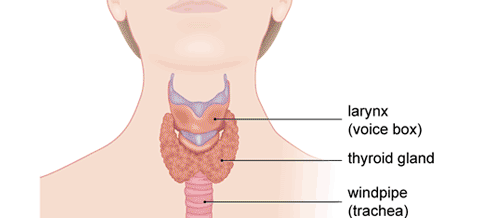f you have an underactive thyroid (hypothyroidism), it means your thyroid gland isn’t producing enough thyroid hormones.
Too little thyroid hormone slows down your body’s metabolism. Your metabolism is the combination of chemical processes that happen in yourbody, such as those that change the food you eat into energy. When your metabolism slows down, it can lead to symptoms such as feeling tired and cold, and putting on weight.
Your thyroid gland is in your neck, in front of your windpipe. It produces two main hormones called thyroxine (T4) and triiodothyronine (T3). Women are around eight times more likely than men to develop an underactive thyroid. If you’re middle-aged, you’re also more likely to develop it.
Symptoms of underactive thyroid
Symptoms of an underactive thyroid can develop slowly and gradually, sometimes over several years. The symptoms of underactive thyroid can also be quite vague and can be caused by many other conditions or situations, such as feeling tired. This can sometimes make it hard to diagnose.
The main symptoms of underactive thyroid include:
- feeling cold / less able to cope with cold
- gaining weight
- feeling tired with stiff muscles
- dry skin and hair loss
- heavy, irregular or no periods
- slowing down, mentally and physically
- a deep and raspy voice
- constipation
- cramps
- tingling in your hands and arms

Diagnosis of underactive thyroid
Your GP will ask about your symptoms and examine you. They may also ask you about your medical history.
If your GP thinks you may have an underactive thyroid, they will ask you to have one or more blood tests. This is to check the level of thyroid hormones in your body. The main hormones measured in blood tests are:
- TSH – thyroid stimulating hormone
- FT4 – free T4 (thyroxine)
- FT3 – free T3 (triiodothyronine)
If you have an underactive thyroid, you will usually have a TSH level above normal and a free T4 level below normal. The exact levels of hormones measured may vary between different laboratories. So what’s classed as a normal, high or low level for each of the hormones may vary from one area to the next.
If the results of the blood tests show that you have an underactive thyroid, you’ll usually be treated by your GP. But in some circumstances, your GP may refer you to a specialist – usually an endocrinologist – who specialises in treating thyroid conditions.
Treatment of underactive thyroid
The aim of treatment is to ease your symptoms and prevent any complications. This means getting your thyroid hormone levels back to normal.
If you have a mildly underactive thyroid (called subclinical hypothyroidism), you may not need any treatment. If you’re not having treatment, your GP will usually check your thyroid hormone levels every six to 12 months.
Medicines
Your doctor may prescribe you a hormone replacement medicine called levothyroxine (thyroxine). You take this once a day as a tablet.
Usually, you start by taking a small amount of levothyroxine and this is gradually increased. Your GP will take a blood sample every three to four weeks and then change the amount, depending on the results.
It can take a while for your hormone levels to get back to normal, so it may be a few months until you start to feel better. Once your thyroid levels have returned to normal, you’ll usually have a blood test once a year to check your thyroid hormone levels. You will need to take levothyroxine for the rest of your life.
Causes of underactive thyroid
In the UK, the most common cause of underactive thyroid is autoimmune thyroiditis (Hashimoto’s thyroiditis). This is when your immune system attacks your thyroid gland, damaging it and stopping it producing enough thyroid hormone. If you have had your thyroid gland removed or radioactive iodine treatment for an overactive thyroid, this can cause an underactive thyroid. Radiotherapy for thyroid cancer can also lead to an underactive thyroid.
Other causes of underactive thyroid include:
- some medicines, such as lithium and amiodarone
- an infection caused by a virus (thyroiditis)
- pregnancy – around one in 20 women develop an underactive thyroid in the six months after their baby is born
Complications of underactive thyroid
The symptoms of an underactive thyroid, such as physical and mental tiredness and lack of energy, can have a serious effect on your day-to-day life. You may find that your work life, relationships and social life suffer.
If you’re pregnant, an underactive thyroid can mean your baby may be born early or underweight. It can also lead to miscarriage.
Other complications include:
- heart problems, such as chest pain (angina) and an irregular and fast heartbeat (atrial fibrillation)
- myxoedema – this is a rare but serious condition that can affect your heart – it can be life-threatening
